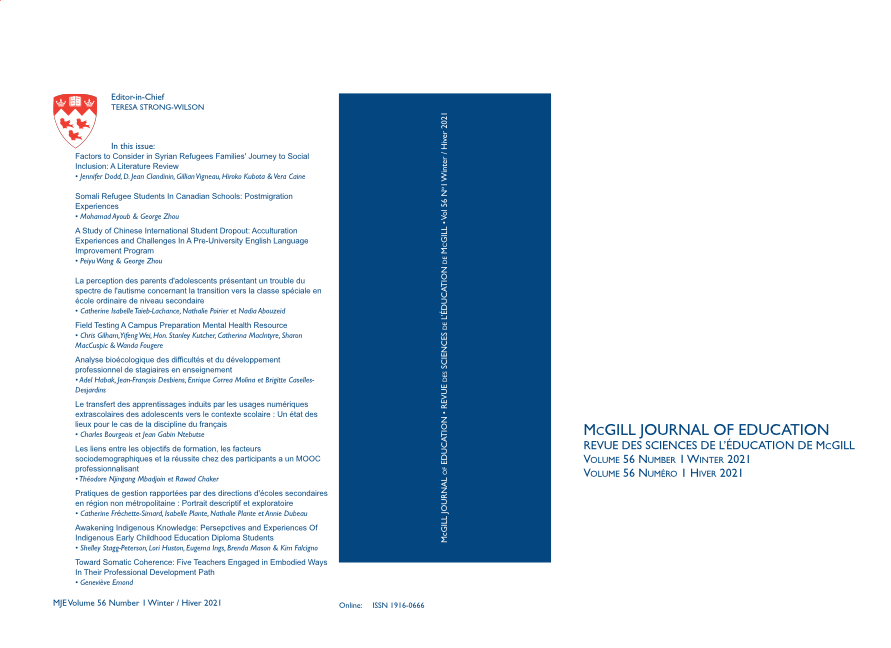Facteurs à considérer dans le trajet des familles de réfugiés syriens vers l'inclusion sociale : Une revue de la littérature
Mots-clés :
scolarité, l’inclusion sociale, familles, jeunes enfants, réfugiés syriensRésumé
Cet article propose une revue de la littérature de recherche sur les expériences des jeunes enfants et de leurs familles qui ont quitté la Syrie en tant que réfugiés et se sont réinstallées au Canada. Nous identifions cinq facteurs clés qui influencent l’expérience d’inclusion sociale des réfugiés syriens dans le contexte des systèmes scolaires publics et dévoilons les silences dans et à travers les études actuelles. Les cinq facteurs sont les expériences avant l’arrivée, la santé mentale, les soutiens sociaux, l’acquisition de compétences en anglais et le manque de préparation des enseignants et des écoles. Nous décrivons les recherches nécessaires pour mieux comprendre l’inclusion sociale des familles de réfugiés syriens avec de jeunes enfants au Canada.
Références
Adair, J., & Tobin, J. (2007. Listening to the voices of immigrant parents. In C. Genisha & A. Lin Goodwin (Eds.), Diversities in early childhood education: Rethinking and doing (pp. 137150). Routledge.
Allman, D. (2013). The sociology of social inclusion. Sage Open, 3, 116. https://doi.org/10.1177/2158244012471957
al Rabeeah, A.B. & Yeung, W. (2018) Homes: A refugee story. Freehand Books.
Clark, A. K. (2017). Are we ready? Examining teachers’ experiences supporting the transition of newly-arrived Syrian refugee students to the Canadian elementary classroom [Unpublished master’s thesis]. University of Toronto.
Danso, R. (2002). From ‘there’ to ‘here’: An investigation of the initial settlement experiences of Ethiopian and Somali refugees in Toronto. GeoJournal, 56, 314. https://doi.org/10.1023/A:1021748701134
Gagné, A., Schmidt, C., & Markus, P. (2017). Teaching about refugees: Developing culturally responsive educators in contexts of politicised transnationalism. Intercultural Education, 28(5), 429446. https://doi.org/10.1080/14675986.2017.1336409
Gioia, K. E. (2015). Immigrant and refugee mothers’ experiences of the transition into child care: A case study. European Early Childhood Education Research Journal, 23(5), 662672. https://doi.org/10.1080/1350293X.2014.970854
Grieshaber, S. J., & Miller, M. G. (2010). Migrant and refugee children, their families, and early childhood education. In O. Saracho & B. Spodek (Eds.), Contemporary perspectives on language and cultural diversity in early childhood education (pp. 167190). Information Age Publishing.
Hadfield, K., Ostrowski, A., & Ungar, M. (2017). What can we expect of the mental health and well-being of Syrian refugee children and adolescents in Canada? Canadian Psychology / Psychologie Canadienne, 58(2), 194201. https://doi.org/10.1037/cap0000102
Hassan, G., Kirmayer, L. J., Ventevogel, P., Mekki-Berrada, A., Quosh, C., el Chammay, R., Deville-Stoetzel, J.B., Youssef, A., Jefee-Bahloul, H., Barktell-Oteo, A., Coutts, A., & Song, S. (2015). Culture, context and the mental health and psychosocial wellbeing of Syrians: A review for mental health and psychosocial support staff working with Syrians affected by armed conflict. UNHCR. https://www.unhcr.org/55f6b90f9.pdf
Immigration, Refugees and Citizenship Canada. (2016). Setting the context: Syrian refugee resettlement in Canada. SSHRC. http://www.sshrc.ualberta.ca/en/Toolkit/Resources/~/media/Social Sciences and Humanities ResearchCouncil/Refugee_Resettlement-BackgroundCanada_(2016).pdf
Immigration, Refugees and Citizenship Canada. (2018). Immigration, Refugees and Citizenship Canada Departmental Plan 2018–2019. https://www.canada.ca/en/immigration-refugees-citizenship/corporate/publicationsmanuals/departmental-plan-2018-2019/departmental-plan.html
Kurdi, T. (2019). The boy on the beach: My family’s escape from Syria and our hope for a new home. Simon and Schuster.
Merali, N. (2008). Social conditions and refugee mental health before and after migration. In M. K. Zimmermann (Ed.), Political refugees: Social conditions, health, and psychological characteristics (pp. 131). Nova Science Publishers.
Omidvar, R. & Richmond, T. (2003). Immigrant settlement and social inclusion in Canada. Laidlaw Foundation.
Renzaho, A. M. N., McCabe, M., & Sainsbury, W. J. (2011). Parenting, role reversals and the preservation of cultural values among Arabic speaking migrant families in Melbourne, Australia. International Journal of Intercultural Relations, 35, 416424. https://doi.org/10.1016/j.ijintrel.2010.09.001
Sims, M., & Hutchins, T. (2001). Transition to child care for children from culturally and linguistically diverse backgrounds. Australian Journal of Early Childhood, 26(3), 77. https://doi.org/10.1177%2F183693910102600303
Stewart, J. (2014). The school counsellor’s role in promoting social justice for refugee and immigrant children. Canadian Journal of Counselling and Psychotherapy, 48(3), 251269.
Thomas, T. N. (1995). Acculturative stress in the adjustment of immigrant families. Journal of Social Distress & The Homeless, 4, 131142. https://doi.org/10.1007/BF02094613
Torraco, R.J. (2016). Writing integrative reviews of the literature: Methods and purpose. International Journal of Adult Vocational Education and Technology, 7(3), 6270. https://doi.org/10.4018/IJAVET.2017070106
UNHCR. (2019). Global trends. Forced displacement in 2018. https://www.unhcr.org/5d08d7ee7.pdf
Vandenbroeck, M., Roets, G., & Snoeck, A. (2009). Immigrant mothers crossing borders: nomadic identities and multiple belongings in early childhood education. European Early Childhood Education Research Journal, 17(2), 203216. https://doi.org/10.1080/13502930902951452
Walker, J., & Zuberi, D. (2020). School-aged Syrian refugees resettling in Canada: Mitigating the effect of pre-migration trauma and post-migration discrimination on academic achievement and psychological well-being. Journal of International Migration and Integration, (21), 397411. https://doi.org/10.1007/s12134-019-00665-0
Wong, S., & Turner K. (2014). Construction of social inclusion within Australian early childhood education and care policy documents. Contemporary Issues in Early Childhood, 15(1), 5468. https://doi.org/10.2304/ciec.2014.15.1.54
Yamashita, A. C. (2018). Specific needs in literacy & language learning of refugee children: A comparison of German and Canadian Syrian refugee families [Unpublished master’s thesis]. University of Toronto.
Yohani, S., Brosinsky, L., & Kirova, A. (2019). Syrian refugee families with young children: An examination of strengths and challenges during early resettlement. Journal of Contemporary Issues in Education, 14(1), 1332. https://doi.org/10.20355/jcie29356
Téléchargements
Publié-e
Comment citer
Numéro
Rubrique
Licence
(c) Tous droits réservés McGill Journal of Education / Revue des sciences de l'éducation de McGill 2022

Cette œuvre est sous licence Creative Commons Attribution - Pas d'Utilisation Commerciale - Pas de Modification 4.0 International.



